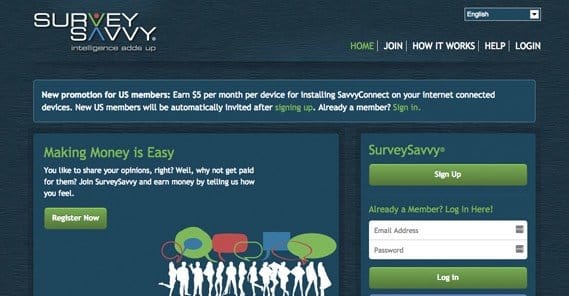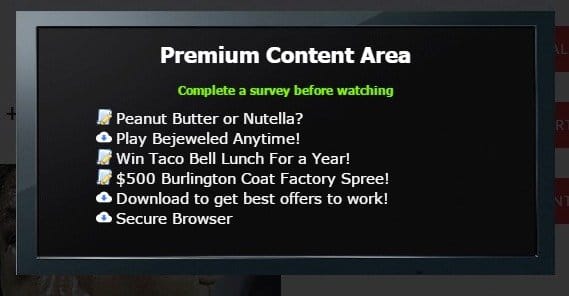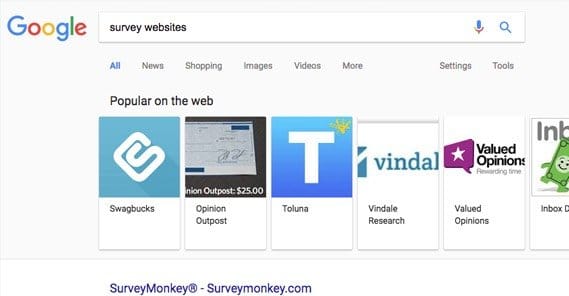Paid surveys are an interesting beast. From the consumer’s end, they’re a way to rack up a little cash. Sites like Ipsos, SurveySavvy, and others are survey networks where a user signs up, is sent surveys, and ends up making $2-$4 an hour if they’re lucky. Now and then a larger market research project comes along, paying $50 or $100, but most people don’t qualify.
Surveys are a kind of dream for newbies starting out making money online. Often they have just lost a job or are growing frustrated with the lack of easy opportunities around, but don’t trust themselves to dive headlong into actual internet marketing or product sales. There’s an element of instant gratification; you can sign up and make a few bucks almost immediately.

None of this is relevant to the other side of the coin; promoting paid surveys. The “money-making” audience is not your target demographic. Instead, you’re looking to capture the attention of people who are willing to pay with their opinion for some reward.
Getting paid to promote paid surveys is an affiliate’s game. As with most affiliate marketing, it comes down to two things; finding the right trustworthy programs, and pumping an incredible amount of volume through it.
How It All Works
If you want to promote paid surveys, what you need to do is set up some channel where you have people who would be interested in those surveys. You find the companies that provide those surveys and locate their affiliate programs. Then you get to promoting. This can happen generally in two ways.
The first way is with surveys that have some kind of intangible, non-monetary payment attached to them. You often find these attached to free to play MMOs and other sorts of referral programs. The company promotes the survey with something of their own attached; you might get a free trial of Netflix and $1.50 in game credit if you fill out the survey and they accept your data.

I always find these to be the least effective and sketchiest of the options. One reason is that you’re giving away value in exchange for the survey, and you’re hoping the data is accepted. If you give away $1.50 and only make $1, what good does it do you? The other reason is that these kinds of offers have a pretty bad reputation. Often you’ll find your audience is very skeptical of filling out these surveys, because they or people they know have spent time filling them out and never been given the reward at the end of the line.
The alternative is to promote individual survey sites and survey programs from an authoritative point of view. You’re not trying to incentivize individual surveys, you’re promoting survey networks, like the ones I mentioned up above.
There are two ways this can go. One of them is with a site like this. Take a look at that and tell me what you see. Good? Here’s what I see.
- A pre-Panda exact match domain.
- A very basic layout with bright colors, poor design, and stock photos.
- A list of links for “articles” that are all the same thing with slight keyword variations.
- Very little useful information.
- Ever-present, pushed calls to action.
This is the lowest of the low, and the fact that it even ranks in Google right now is something of an anomaly. Usually a site like this would be hammered for thin content and keyword spam.
The second way you can approach the issue is more like this site. This is an interview from a veteran affiliate marketer and someone who has taken surveys to make money for years. It’s a lengthy, valuable post on a site full of resources for people looking to get started with marketing and making money online.
The most important part here is that the text mentions specific survey companies as examples without explicitly promoting them. They don’t go off on a 1,000-word tangent about how good a specific survey site is, they simply mention it. While doing so, in the larger context, you already get the implication that it’s a higher quality company.
And, of course, the links to every survey site are affiliate links. When the user is convinced, clicks through, and signs up for the service, the site owner gets the affiliate referral and makes some money.
Specific Methods for Promoting Paid Surveys
If you’re really hoping to promote paid surveys and earn money via affiliates yourself, you have some options, but keep in mind that these are generally very low commission. You’re going to need extremely high volume to make any significant money.
Option 1: Social Media Shares. This is probably the easiest but also the least effective method. Everyone who ever gets hooked into a pyramid scheme, affiliate network, or other promotional earner ends up sharing to their friends and family on Facebook relentlessly. A few will bite, but most will probably ignore it or even block you.
You also have to content with filtering algorithms. Facebook will quickly see that people are ignoring your survey links and will limit who sees them, and you’ll see diminishing returns.

You can, however, take this one step further. Instead of simply sharing to friends and family, you can build a community – or invade one that already exists. Find online groups dedicated to making money, dedicated to surveys, or just looking for opportunities. Step into those groups and promote your surveys.
As with any social group marketing, you run the risk of being blocked by admins depending on how transparent you are about it. It’s simply one of those markets that is so saturated with spam that it’s difficult to find a foothold as a legitimate affiliate.
Option 2: Content Lockers. This method requires you to have a resource that is itself valuable. In fact, the resource needs to be valuable enough to get people interested in paying for it with their actions.
The standard content locker is a simple script that requires the user follows you on Facebook or Twitter or whatever other site you’re using before they can access the content. Usually this content is part of an article, an ebook, or some kind of template resource.

If you have this kind of content and want to make money off of it, switching your content locker to a survey can do it. If you properly frame it, you can even convince people that they’re getting value by signing up for the survey site themselves. After all, they can make money too, right? Unfortunately, it’s a lot more to ask of a person that they sign up for paid surveys with their personal information, as opposed to a simple Facebook like.
Option 3: Paid Advertising. As the saying goes, you have to spend money to make money, right? One example from four years ago on the Warrior Forum is a good showcase of this. The guy paid $4,000 for a month of advertising on a large news site. That investment promoted a paid survey affiliate link. In return, over the course of the month, he made $34,000. That’s one heck of a profit, but it’s also one very large initial investment.
He mentions later in the thread that he would have repeated the investment, except the site changed the way they handled advertising and that second month’s slot would have been more like $15,000. That’s an even larger initial investment, an even smaller profit, and a lot more room for things to go wrong.
So, you know. Paying to promote an affiliate link can work, but only if you are in the right situation. You need:
- To be able to handle the loss if the investment doesn’t pan out.
- To be able to afford the initial investment on a large enough scale to earn maximum payouts.
- To accurately identify the target audience of your survey, find a suitably large site that will run an affiliate ad, for an amount of money that can get you a return.
You can’t just drop $10 and expect to get $100 out of it. One day you might, and the next you might get nothing. You never know who you’re reaching with your ads, and only large-scale experimentation can keep you going. It’s a precarious game, as mistakes can be very costly.
Option 4: Authority Blogging. The affiliate marketer example above, the interview blog, is one such example. The most effective method of affiliate marketing these days is to create a blog designed to help people with something, and use affiliate links to resources that can help them. Links to ebooks, links to other blogs, links to services and products, even links to surveys.
When you’re promoting paid surveys, you need to think of who is going to be your target demographic. It’s not people interested in sharing their opinion – those people can post in any comments section in the world. It’s people who are after the money. That means you’re going to be creating a blog based around making money online.

The downside here is that there’s a ton of competition for that niche already. You have big marketing sites, marketing communities, and that’s not even scratching the surface. Your strongest competition will probably be the WAHM sites, and let me tell you, you’re going to be in for a challenge when you go up against communities that have been at this for literal generations.
Option 5: Automated Promotion. Let’s be honest here. What is “automated promotion” but spam? If you want to go this route, you’re basically just programming a spambot to share your affiliate link all over the web. You’re going for the ultimate in high volume, low return strategies, and it’s probably not going to work.
The primary problem with a spam technique like this is just that your account will end up shut down after a while. Affiliate networks don’t want to be associated with spam, for obvious reasons, so they’ll shut down anyone they notice sending shady referral links. Plus, of course, you’ll get very little actual traffic.
Option 6: Traffic Sharing. If you can’t beat ‘em, join ‘em, right? One technique you can use is to work with the people who already own big name sites. All those work at home mom sites will take guest posts or interviews, and you might be able to convince them to share your affiliate link in a post. You might offer them a cut of the profits, or just sneak it through, and make your own money. The trick is just that you need to have something of value on offer, which generally means having your own site already. It’s not really a technique you can dive right into.
Finding Good Survey Affiliate Programs
For the end here, I’ll talk briefly about finding the right affiliate programs you can actually promote. You need to do your due diligence; if you promote a survey that doesn’t pay out, or a company that harvests and sells personal information, you’re going to lose your trust very quickly.
It’s not difficult to find a large list of market research companies that do surveys, you can find large lists out there on all of these work at home sites. Look for their affiliate programs and see what kind of terms you find. If you only get paid when the user gets a payout, you’ll be at it a long time; payouts tend to take weeks or months of effort before they bank enough to trigger. You’re looking for bonuses on signup or on first survey.

You’ll also want to search for reviews of both the survey site and their affiliate network. The worse the reviews, the harder the time you’ll have trying to get people to sign up, and the lower your payments will be.
At the end of the day, you certainly can make some money with promoting paid surveys, but it’s not much money unless you either have a huge initial investment, or you have a ton of traffic to leverage in the right industries. And, well, if you have those, there are better ways to use them.
The post Can You Earn a Living By Promoting Paid Surveys Online? appeared first on Growtraffic Blog.
